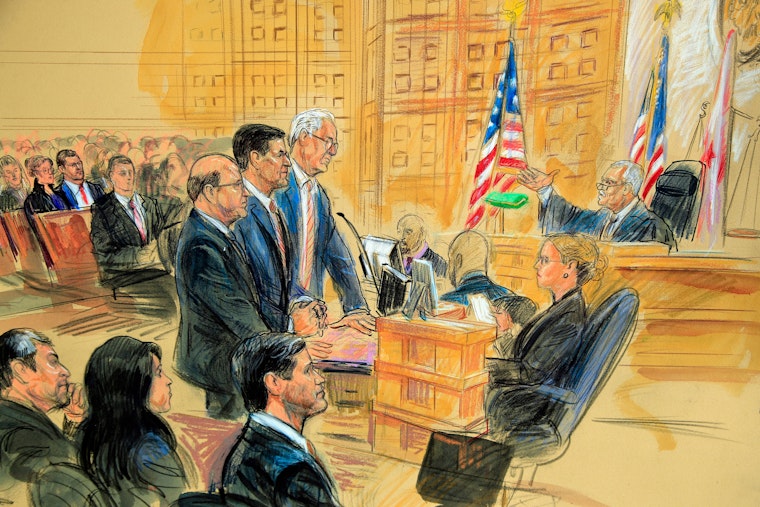A Recipe for Autocracy
By James Goldston & Maïté De Rue

Yesterday, the U.S. Court of Appeals, represented by a panel of three judges selected at random, ordered a trial judge to immediately dismiss the case against President Trump’s former national security adviser, Michael Flynn, who pleaded guilty to lying to the FBI in late 2017 as part of the Mueller investigation. While the case has been one of the most politically charged episodes involving the Trump administration’s Justice Department, the ruling in Flynn’s favor did not turn on the merits of Flynn’s conduct. Rather, it examined whether Judge Emmet G. Sullivan, the trial judge assigned to the case, had the authority to scrutinize the Justice Department’s decision in May to drop criminal charges—a request that has been criticized for its apparently nepotistic treatment of Michael Flynn as a member of President Trump’s inner circle. Yesterday’s ruling by the Court of Appeals, which ordered Judge Sullivan to rubber-stamp the Justice Department’s request without further review, is a sign that some members of the U.S. federal judiciary are burying their heads in the sand.
The ramifications of yesterday’s decision extend far beyond Michael Flynn. In fact, a trial judge’s power to review a prosecutor’s decision to drop criminal charges is a lynchpin of the democratic principle of equality under the law. There is a real risk, particularly in cases against high-profile or politically connected defendants, that the power to dismiss may be abused to protect allies, punish enemies, conceal misconduct, and serve political or narrow personal interests for reasons unrelated to the evidence. That’s why the ruling by the U.S. Court of Appeals is so disappointing, and should be overturned.
Examples from around the world abound of prosecutors abusing their power by failing to press criminal charges against the well-connected, with damaging consequences for the rule of law. Former South African Vice President Jacob Zuma avoided prosecution related to a 1999 arms deal for years, despite reportedly abundant evidence. It was this decision by South African prosecutors to abandon charges of corruption, money laundering, and racketeering more than a decade ago that opened the door for Mr. Zuma to become President. It also signaled tolerance for corruption at the highest levels of government, and tarnished the country’s hard-won democracy.
Similarly, prior to national elections in 2019, Guatemala’s attorney general waited to file charges against presidential candidate and ally of the then-president Sandra Torres for having accepted $2.5 million in unreported illicit campaign funds until the day after her candidacy became official, making her immune from prosecution. Ultimately, the decision delivered the coup de grâce to a then-vibrant anti-corruption movement that briefly threatened the country’s political and economic elite.
In other cases, political meddling in the criminal justice system can serve, or be perceived to benefit, narrow political interests. For instance, a Canadian controversy erupted in 2018 when the then-majority Liberal government was accused of attempting to influence the Attorney General, who is also the Minister of Justice, to drop criminal charges against the construction company SNC-Lavalin for purportedly electoral reasons. The Parliament of Canada's Ethics Commissioner subsequently released a report affirming that the actions of Prime Minister Justin Trudeau contravened the Conflict of Interest Act.
In fact, the question of prosecutorial accountability is of such importance that international bodies have increasingly weighed in. According to the Council of Europe’s Venice Commission, “The biggest problems … arise … when the prosecutors decide not to prosecute. If there is no legal remedy—for instance, by individuals as victims of criminal acts—then there is a high risk of non-accountability.” The United Nations Office on Drugs and Crime has endorsed “review of a prosecutor’s decision not to prosecute a particular individual” to ensure that it is “based on the law and on no other extraneous factors.” The European Parliament recommends: “Member States shall ensure that victims, in accordance with their role in the relevant criminal justice system, have the right to a review of a decision not to prosecute.”
To be sure, there may be good reasons for prosecutors to end a case before verdict. For example, new facts can shed a different light on an indictment, evidence once thought to be persuasive can turn out to be less compelling at trial, or prospective punishment may be too severe. This is the kind of rationale that a judge could readily accept when assessing whether to dismiss a case. But this does not define the situation surrounding charges against Michael Flynn, who previously admitted under oath that he had lied more than once to the FBI, crimes which he now—with the Court of Appeals’ blessing—denies.
The behavior of Attorney General William Barr in this case and others marks an unprecedented shift from the Justice Department’s historic ambition of operating free from partisan considerations. The Attorney General has repeatedly contorted logic and custom to serve the political interests of a President who has no scruples about trampling on the rule of law. Judge Sullivan’s decision to appoint a former prosecutor and judge to offer an independent view of the Justice Department’s request to dismiss charges against Michael Flynn was not just reasonable; it was an important test case of a fundamental bedrock of our democratic system. It is one that the majority of the three-person Court of Appeals panel failed when it issued its ruling. But the full Court can and should overturn yesterday’s decision. Without any accountability, prosecutors can apply different rules for those allied with the powerful than for everyone else. That’s a recipe for autocracy.

James A. Goldston is the executive director of the Open Society Justice Initiative.
Maïté De Rue is a legal officer for national criminal justice reform with the Open Society Justice Initiative, where she focuses on criminal justice reforms, and in particular prosecutorial independence and accountability.